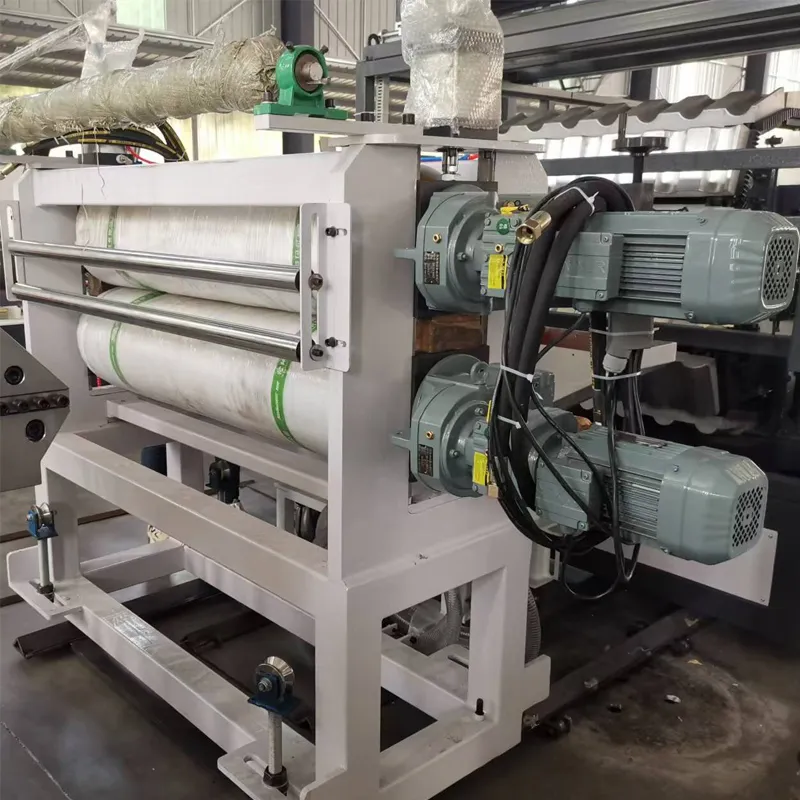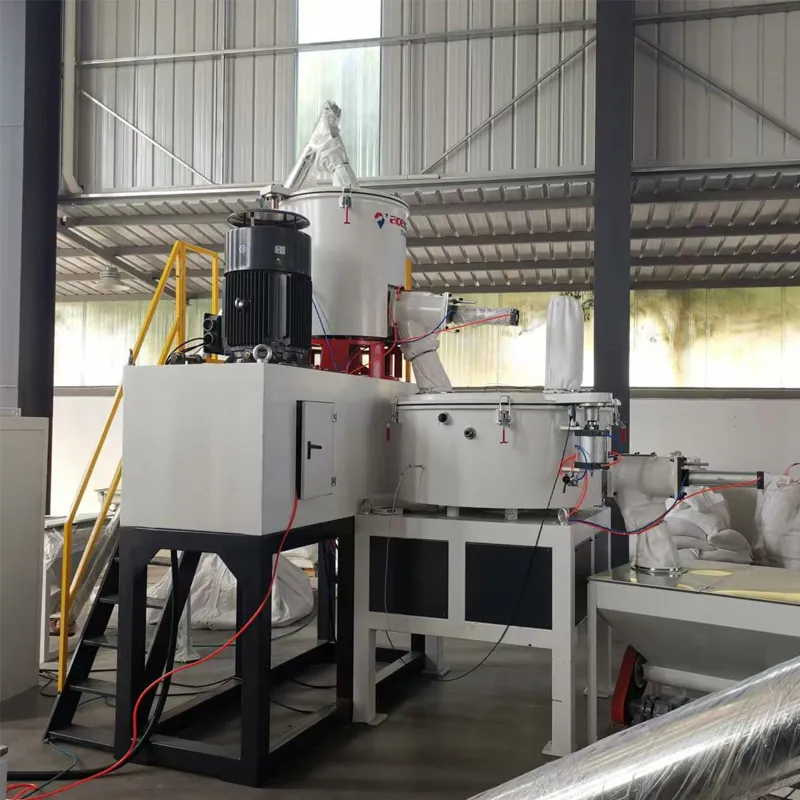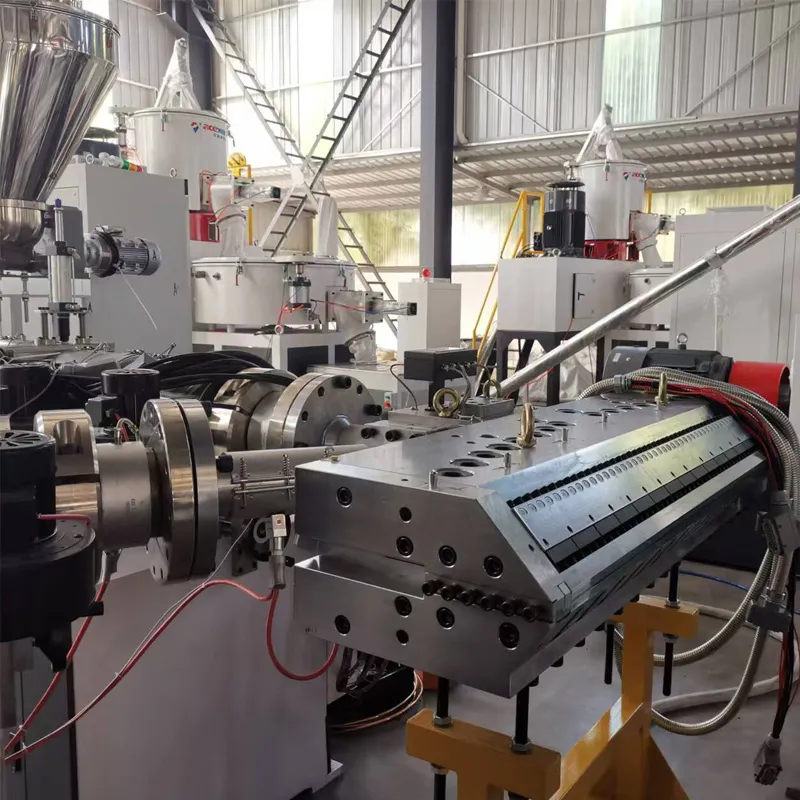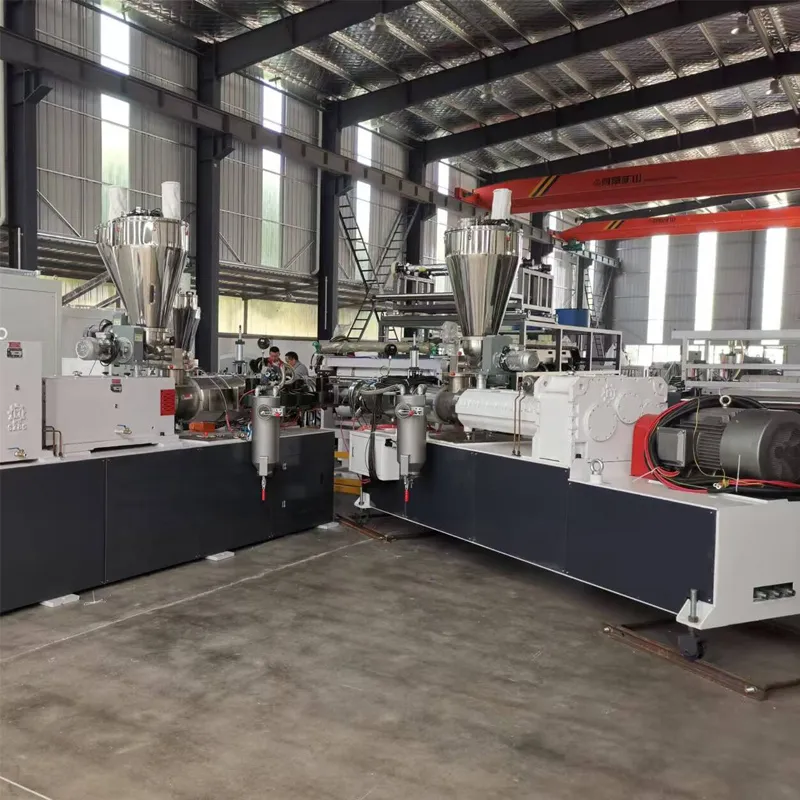PVC Profile Extrusion Machines & Lines | High-Quality Solutions
The Advanced World of PVC Profile Extrusion
In the realm of modern manufacturing, the process of pvc profile extrusion stands as a cornerstone technology, driving innovation across countless industries. This sophisticated process involves melting and molding polyvinyl chloride (PVC) resin into continuous shapes or "profiles," offering unparalleled versatility in design and application. From robust construction materials to intricate industrial components, PVC profiles deliver a compelling combination of durability, cost-effectiveness, and performance. As a leading solution for businesses seeking high-quality, customized plastic profiles, understanding the nuances of this technology is paramount. Our focus today delves into the critical aspects of PVC profile manufacturing, exploring its technological depth, market trends, and practical applications that significantly impact global supply chains and product development. This comprehensive overview is designed for B2B decision-makers and technical experts who require a deep understanding of the capabilities and advantages inherent in modern extrusion processes, particularly when considering equipment like a advanced pvc sheet production line.
The market for PVC profiles is experiencing steady growth, fueled by increasing demand in construction, automotive, and consumer goods sectors. Innovations in material science, such as the development of lead-free and fire-retardant PVC compounds, are enhancing product safety and environmental compliance. Furthermore, the push for energy efficiency in buildings has significantly boosted the adoption of PVC window and door profiles, which offer superior insulation properties compared to traditional materials. This trend necessitates the deployment of highly efficient and precise machinery, such as an advanced pvc profile extrusion line, capable of producing profiles with tight tolerances and consistent quality. Emerging markets, particularly in Asia and Latin America, are also contributing to this expansion, as urbanization and infrastructure development projects accelerate the need for versatile and affordable building materials.
Unveiling the PVC Profile Extrusion Process
The manufacturing of PVC profiles through extrusion is a precise, multi-stage operation. It begins with the careful formulation of PVC resin, which is compounded with various additives such as heat stabilizers, lubricants, impact modifiers, fillers, and pigments. This custom blend determines the final product's specific characteristics, including its color, UV resistance, flexibility, and mechanical strength. The mixture is then fed into an extruder, typically a twin-screw extruder for PVC, where it is heated and plasticized under controlled conditions. This melting process ensures the material reaches a uniform, molten state, ready for shaping. The extruder’s screws convey the molten PVC through a precisely engineered die, which gives the material its desired profile shape. This critical stage, known as the die forming, requires exceptional precision to maintain consistent dimensions and surface finish.

Following the die, the newly formed profile enters the calibration and cooling section. This stage is crucial for dimension stability and involves vacuum calibration tanks or sizing sleeves that precisely shape and solidify the profile as it cools. Water cooling systems are typically used to rapidly bring down the temperature, ensuring the profile retains its exact dimensions and avoids warping. After cooling, a haul-off unit pulls the solidified profile at a consistent speed, maintaining tension and preventing distortion. Finally, a cutting unit precisely cuts the continuous profile into predetermined lengths. Quality control is maintained throughout the entire process, with regular checks for dimensional accuracy, material integrity, and surface finish. Products are often subject to stringent inspection standards such as ISO 9001 for quality management, ASTM standards for material properties, and ANSI specifications for specific applications, ensuring high reliability and a long service life. These profiles find extensive use across various sectors including construction (e.g., window frames, siding), automotive (e.g., interior trims), and furniture, offering advantages like superior corrosion resistance, low maintenance, and excellent thermal insulation, which contributes to energy savings in end-use applications.
Technical Parameters and Performance Data
The performance of a pvc profile extrusion machine is defined by a range of critical technical parameters that directly impact efficiency, output, and product quality. Key specifications include extruder type (e.g., conical twin-screw, parallel twin-screw), screw diameter and L/D ratio, motor power, heating zones, and maximum output capacity. For a typical pvc sheet extrusion machine, factors like sheet width, thickness range, and surface finish requirements also become paramount. Understanding these parameters is essential for selecting the right equipment that aligns with specific production needs and desired profile characteristics. Manufacturers often provide detailed specification sheets, which are vital for comparing different models and optimizing production lines.

| Parameter | Typical Range | Impact on Performance |
|---|---|---|
| Extruder Type | Conical Twin-Screw / Parallel Twin-Screw | Determines plasticizing efficiency and output stability for PVC. |
| Screw Diameter (mm) | 50/105 to 92/188 (Conical); 65 to 130 (Parallel) | Directly correlates with material throughput capacity. |
| Output Capacity (kg/hr) | 150 to 800+ | Indicates production volume and efficiency. |
| Main Motor Power (kW) | 37 to 132 | Influences energy consumption and torque available for processing. |
| Overall Power Consumption (kW) | 60 to 250+ (Total Line) | Operational cost factor; higher efficiency machines consume less. |
| Profile Width/Size (mm) | Customizable, up to 1200+ for sheets | Determined by die design; critical for product application. |
| Cooling Method | Vacuum Calibration Tank / Spray Cooling | Ensures dimensional stability and cooling efficiency. |
Accurate control over temperature profiles across different heating zones, along with precise vacuum pressure in the calibration tank, are paramount for achieving consistent product quality. Data from real-world applications demonstrate that well-maintained extrusion lines with optimized parameters can achieve material utilization rates exceeding 98%, significantly reducing waste. Furthermore, advancements in automation and control systems allow for real-time monitoring and adjustment of these parameters, leading to higher precision, reduced downtime, and enhanced operational efficiency. This data-driven approach to production ensures that the resulting PVC profiles meet the most rigorous industry standards for performance and durability.
Diverse Application Scenarios and Technical Advantages
The versatility of pvc profile extrusion enables its application across a vast array of industries. In construction, PVC profiles are indispensable for window and door frames, wall cladding, roofing (like the output of a Pvc Roof Sheet Roll Forming Machine), fencing, and decking. Their inherent resistance to moisture, rot, and pests makes them a superior alternative to traditional materials, especially in challenging environments. The ability to customize profiles in various colors, textures, and finishes also contributes to their aesthetic appeal in architectural designs. Beyond construction, PVC profiles are crucial in the automotive sector for interior and exterior trim, seals, and conduits, where their lightweight nature contributes to fuel efficiency.

Technically, PVC profiles offer a multitude of advantages. Their excellent chemical resistance makes them suitable for use in industries dealing with corrosive substances, such as petrochemical and water treatment facilities, where traditional materials might degrade rapidly. The material's inherent flame retardancy also provides a significant safety advantage in residential and commercial buildings. From an engineering perspective, PVC profiles boast an impressive strength-to-weight ratio, simplifying transportation and installation. Furthermore, the extrusion process allows for the creation of complex cross-sections and multi-chamber designs, which can significantly enhance thermal insulation properties and structural rigidity. The consistent quality achievable with modern pvc profile extrusion line equipment ensures that each profile meets exact specifications, reducing material waste and improving overall project efficiency. These technical strengths, combined with long service life and minimal maintenance requirements, translate into substantial long-term cost savings for end-users across diverse application sectors.
Strategic Manufacturer Comparison and Customization Expertise
When sourcing a pvc profile extrusion machine or line, discerning manufacturers from the multitude available requires a strategic approach. Key factors for comparison include a manufacturer's technological sophistication, evidenced by their use of advanced automation and precise control systems, and their adherence to international quality standards such as ISO 9001 and CE certification. Experience in delivering solutions for diverse industries and a robust portfolio of successful projects are strong indicators of reliability and expertise. Prospective buyers should also evaluate after-sales support, including spare parts availability, technical assistance, and training programs, which are crucial for long-term operational success. A reputable vendor will offer comprehensive service agreements, ensuring minimal downtime and sustained performance of the extrusion line throughout its lifecycle.

Customization is a hallmark of superior pvc profile extrusion services, enabling clients to realize unique designs and meet specific project requirements. Leading manufacturers possess the engineering capabilities to design and fabricate custom dies for bespoke profile shapes, accommodating varying dimensions, wall thicknesses, and internal geometries. This extends beyond mere shape to include material formulations tailored for specific performance needs, such as enhanced UV resistance for outdoor applications, increased impact strength for high-stress environments, or specialized colors for aesthetic integration. Collaborative design processes, where manufacturers work closely with clients from concept to production, ensure that the final product precisely matches specifications while optimizing manufacturing efficiency and cost. This flexibility in design and material science allows for the creation of highly specialized products, giving businesses a competitive edge in their respective markets and enabling the production of innovative solutions such as specialized PVC roof sheets.
Illustrative Application Cases and Real-World Impact
The tangible benefits of high-quality pvc profile extrusion are best illustrated through real-world application cases. Consider a large-scale residential development project in a coastal region, where traditional building materials are prone to rapid degradation due to saltwater corrosion and extreme weather. By utilizing PVC window and door profiles, and potentially PVC roof sheets produced by a pvc sheet extrusion machine, the developer significantly extended the lifespan of the structures, drastically reduced maintenance costs, and improved thermal insulation, leading to lower energy consumption for residents. This strategic choice not only enhanced the durability and sustainability of the buildings but also contributed to a higher return on investment over the long term, demonstrating the profound economic and environmental advantages.

Another compelling example involves the upgrade of urban infrastructure, specifically the replacement of aging metal conduits for electrical wiring and communication cables. PVC conduit profiles, manufactured with superior flame retardant properties and exceptional resistance to chemicals and impact, offered a safer, more durable, and more cost-effective solution. The ease of installation, coupled with reduced material weight, significantly cut down on labor costs and project timelines. These successful implementations highlight the reliability and adaptability of PVC extrusion technology. They underscore its vital role in developing resilient infrastructure and sustainable building practices, emphasizing the importance of selecting a reliable pvc profile extrusion machine that can consistently produce materials meeting stringent performance requirements. Such case studies provide compelling evidence of the long-term value and operational efficiency provided by advanced PVC extrusion solutions.
Compliance: FAQs, Delivery & Support
Ensuring transparency and trustworthiness is paramount for B2B engagements in the pvc profile extrusion sector. We aim to address common concerns directly, providing clarity on our processes and commitments. Our expertise is built upon years of experience in delivering high-performance extrusion solutions to diverse industries. We stand by the authority of our products and services, backed by stringent quality control measures and adherence to international standards.
Frequently Asked Questions (FAQ)
-
Q: What is the typical lead time for a custom pvc profile extrusion line?
A: Lead times vary based on the complexity and customization required. For standard configurations, it's typically 8-12 weeks. For highly customized solutions involving new die designs and specific material formulations, it might extend to 14-20 weeks. We provide a detailed project timeline upon order confirmation. -
Q: What kind of warranty and after-sales support do you offer?
A: Our machines typically come with a 12-month warranty on major components. We offer comprehensive after-sales support, including remote diagnostics, on-site technical assistance, spare parts supply, and operator training programs to ensure smooth operation and longevity of your investment. Our commitment to client success extends well beyond the point of sale. -
Q: How do you ensure the quality and consistency of extruded PVC profiles?
A: We implement a rigorous multi-stage quality control process. This includes raw material inspection, in-process monitoring of extrusion parameters (temperature, pressure, speed), and final product inspection for dimensional accuracy, surface finish, and mechanical properties. Our adherence to ISO 9001 standards and regular internal audits further reinforce our commitment to quality.
Delivery and Support Commitment
Our commitment to efficiency extends to our delivery protocols. We understand that timely delivery is crucial for project timelines and operational continuity. Our logistics team works diligently to ensure on-time delivery of your pvc profile extrusion machine components and complete lines, supported by robust packaging and reliable shipping partners. Furthermore, our dedicated customer support team is available to assist with installation, commissioning, and ongoing maintenance. Through comprehensive training programs, we empower your technical staff to operate and maintain the equipment effectively, maximizing your return on investment and ensuring long-term operational success for your pvc sheet production line.
References
- International Organization for Standardization (ISO). Quality management principles and standards.
- ASTM International. Standards for plastics, including PVC materials and testing methods.
- American National Standards Institute (ANSI). Standards relevant to industrial equipment and product dimensions.
- Plastics Industry Association (PLASTICS). Industry reports and statistics on plastics manufacturing and markets.
- European Committee for Standardization (CEN). European standards for PVC products and construction materials.
